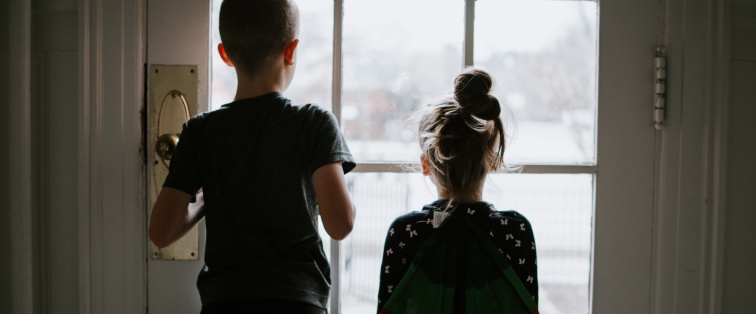Rising Behavioral Health Needs Amid COVID-19: Perspectives Across Multiple Settings

2020 has been a stressful year for all of us. According to the American Academy of Pediatrics 2020 Stress in America survey, nearly 8 in 10 (78%) adults say the pandemic is a significant source of stress in their lives. For children, who thrive in predictability, the pandemic has created unprecedented uncertainty and massive disruptions in daily life and routines.
A recently released Centers for Disease Control and Prevention (CDC) report found that from March to October of 2020, emergency room visits related to children’s mental health rose dramatically compared to the previous year—a 24% increase for children ages 5-11 and a 31% increase among adolescents ages 12-17. These findings underscore how profoundly children have been affected by persistent stress and trauma during this time. For many families, the turmoil they face has been further compounded by the intersection of the pandemic, racial injustice and economic challenges.
Given these concerns, we asked our behavioral health researchers and clinical colleagues to share their perspectives on how this mental health crisis has unfolded across multiple settings at Children’s Hospital of Philadelphia (CHOP), what we’ve seen in previous research, and how research and practice may need to evolve to address challenges families are facing.
Mental Health Visits to the Emergency Department
Mental health-related visits to the CHOP emergency department (ED) during the COVID-19 pandemic are following the national trends recently published by the CDC. Prior to pandemic mitigation measures introduced in March, our ED was seeing a higher number, yet stable proportion, of mental health-related visits compared to previous years. After March, as more people stayed home and fewer patients came to the ED, there has been an increase in the proportion of mental health-related visits than in years past. In addition, as we look closer at our local data, patients with mental health-related ED visits are more likely to require admission, reflecting the severity of issues seen during the COVID-19 pandemic.
Mental health has been a public health crisis for decades, and the pandemic has led to the development and exacerbation of mental health conditions and emergencies. Many barriers that patients and families faced prior to the pandemic are compounded by mitigation practices and stresses on community resources, and access to behavioral health providers has become even more challenging during this time. Fewer outpatient options for some patients may lead them to come to the ED to seek care. Continued collaboration among our teams at CHOP and the community will be necessary to successfully identify the mental health needs of patients and families and work towards effective solutions.
Integrated Care in the Primary Care Network—Healthy Minds, Healthy Kids
Pediatric primary care providers often are children’s first point of contact with behavioral health service delivery. They identify and monitor emotional and behavioral concerns through screening, and they often support families in navigating behavioral health systems of care. Unfortunately, with the onset of the COVID-19 pandemic, there have been declines in family engagement with pediatric primary care due to shelter-in-place orders. This has likely resulted in delays in access to treatment for children with mild to moderate behavioral health concerns, and could be contributing to growing reports of increased severity in those who are seeking care.
For example, in the Healthy Minds, Healthy Kids program, our team is seeing an increase in referrals of patients with more significant clinical issues (e.g., suicidal ideation, self-injurious behavior) and anxiety—including stress related to COVID-19 and racial trauma—and challenges with virtual learning, particularly for children and adolescents with learning difficulties. Families are increasingly raising questions about potential attention deficit hyperactivity disorder (ADHD), and providers are facing difficulty disentangling understandable challenges with virtual learning from ADHD. Our team developed guidelines for families to support establishing effective virtual learning environments, and we continue to encourage family-school collaboration. Particularly during this time, we have found that teachers continue to provide information that is critical to diagnostic decision-making and intervention planning.
Perspectives from the Sleep Clinic
Sleep has the potential to be especially disrupted during the COVID-19 pandemic, contributing to the onset or worsening of child behavioral health problems. Sleep problems such as difficulty falling and staying asleep often co-occur with behavioral health and neurodevelopmental conditions, and during this pandemic our CHOP Sleep Center has seen an influx of pediatric patients with more severe, unmet behavioral health concerns. A number of patients have expressed the recurrence or new onset of suicidal ideation or self-injurious behaviors (e.g., cutting) during quarantine, increased anxiety related to COVID-19 illness, and domestic violence and abuse at home. While patient safety concerns were not uncommon in our clinic prior to the pandemic, we are seeing these concerns more frequently.
Many families have experienced gaps in their behavioral health care that coincide with a worsening in child functioning, whereas others have been unable to initiate care due to the critical shortage of behavioral health providers, limited telehealth services available, and/or family stress and other barriers exacerbated by the pandemic. We are fortunate to have social work support in our pulmonary and sleep medicine division to help navigate the behavioral health care system, but even with this resource, families continue to endure long wait lists, breaks in care and unmet needs during this time. Future research is needed to determine whether broadening the availability, scope, and reach of telehealth treatments—particularly those that could integrate both sleep and behavioral health care for co-occurring conditions—can help to mitigate these barriers.
Taking Caregiver Support Virtual
 Rhonda Boyd, PhD & James Guevara, MD, MPH
Rhonda Boyd, PhD & James Guevara, MD, MPH
We’re also seeing the health impacts of the pandemic on caregivers. One example is the increase in perinatal depression, which is relatively common and is associated with stresses due to childbirth, parenting, and household and neighborhood factors. Mitigation strategies and the profound economic consequences due to the COVID-19 pandemic have increased these stresses among pregnant and postpartum women, resulting in a substantial rise in reported rates of depression. The pandemic has also increased social isolation among new mothers, limiting social interactions and child care support that many women rely on. Therefore, it is increasingly important as this pandemic lingers on to increase efforts to screen and identify women suffering from perinatal depression and provide them with the resources and assistance they need.
 To address the rising rates of postpartum depression (PPD) in particular and its consequences on parenting during the pandemic, researchers at PolicyLab are conducting a randomized trial of a social media-based parenting program among women with high levels of PPD symptoms. Women who screen positive for PPD at their infant’s well visit are enrolled and randomized to an online depression treatment program with or without the parenting program and followed for changes in depressive symptoms and parent-child interactions. Since the program is online and virtual, the hope is that women will be more likely to engage and derive benefit. Evaluating and implementing interventions for postpartum women in virtual formats can help address logistical and other barriers to accessing mental health and parenting interventions that will persist beyond the pandemic.
To address the rising rates of postpartum depression (PPD) in particular and its consequences on parenting during the pandemic, researchers at PolicyLab are conducting a randomized trial of a social media-based parenting program among women with high levels of PPD symptoms. Women who screen positive for PPD at their infant’s well visit are enrolled and randomized to an online depression treatment program with or without the parenting program and followed for changes in depressive symptoms and parent-child interactions. Since the program is online and virtual, the hope is that women will be more likely to engage and derive benefit. Evaluating and implementing interventions for postpartum women in virtual formats can help address logistical and other barriers to accessing mental health and parenting interventions that will persist beyond the pandemic.
Elevating the Importance of Mental Health as Part of the COVID-19 Dialogue
These are just a few perspectives that highlight the trends our experts and colleagues are seeing in practice and in their research. These impressions align with national data and underscore the critical importance of mental health as part of a national dialogue around COVID-19 recovery. As the pandemic continues, there is an urgent need for mental health expertise to be included among the physicians, epidemiologists and public health experts who are working to implement policies that will move the country beyond this crisis.
Shawna Dandridge, LCSW, is a former policy and strategy manager at PolicyLab.
 Jeremy Esposito, MD, MSEd
Jeremy Esposito, MD, MSEd Jennifer Mautone, PhD, ABPP
Jennifer Mautone, PhD, ABPP Ariel Williamson, PhD, DBSM
Ariel Williamson, PhD, DBSM